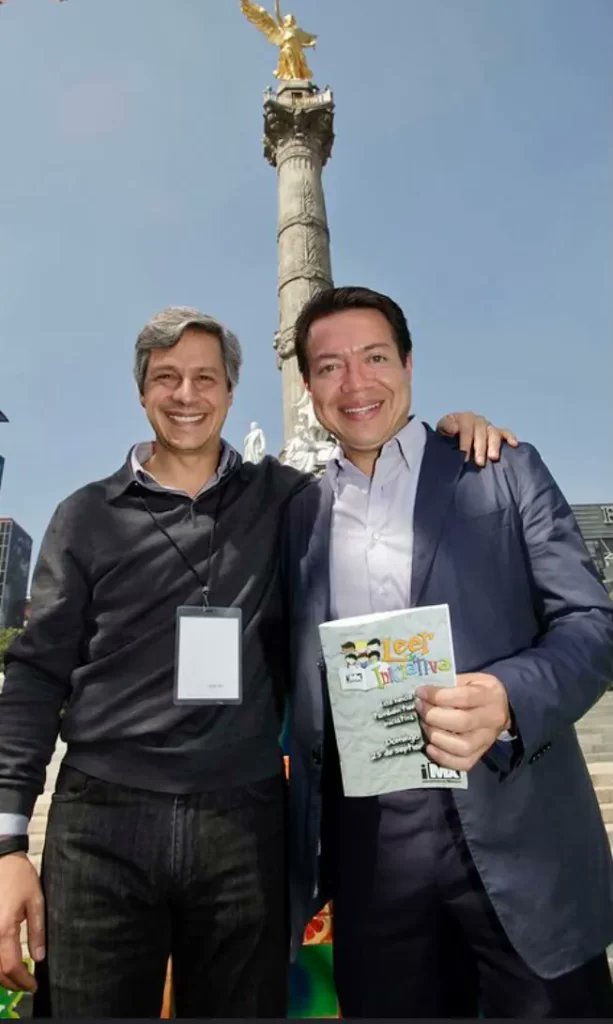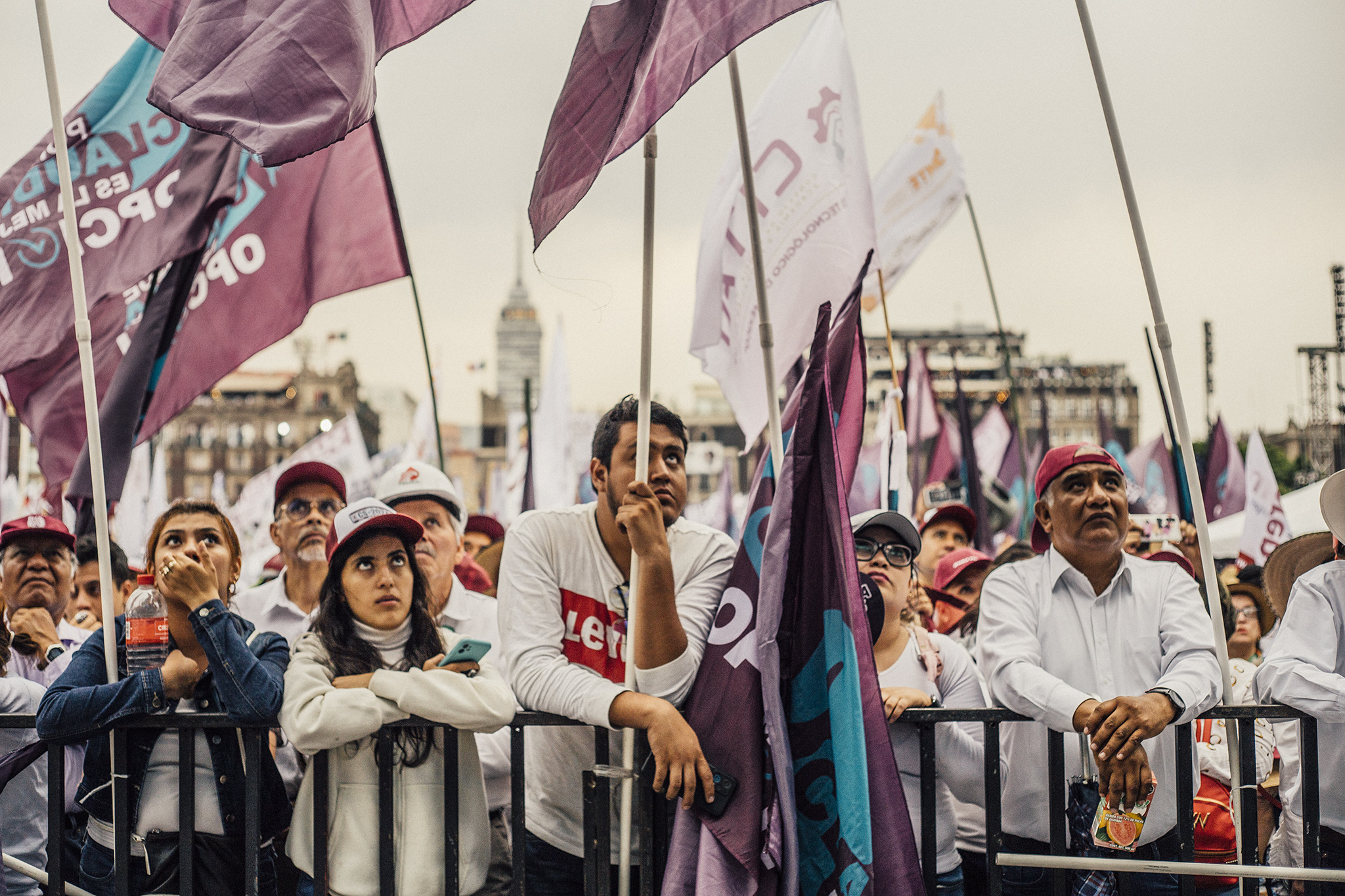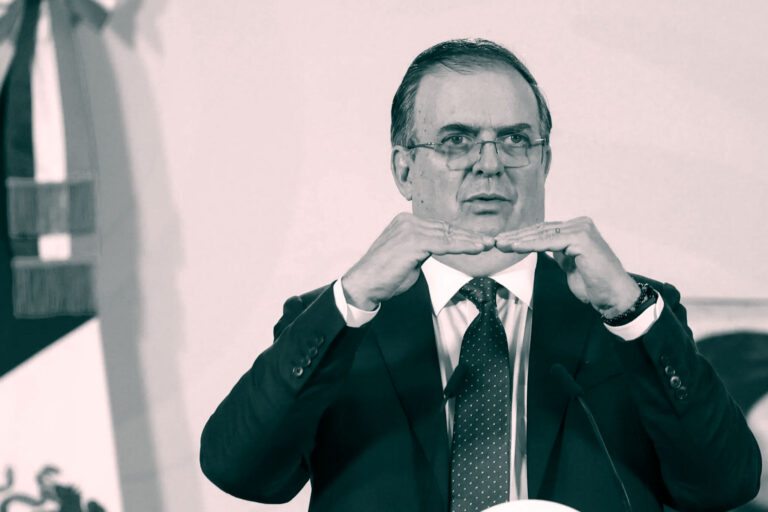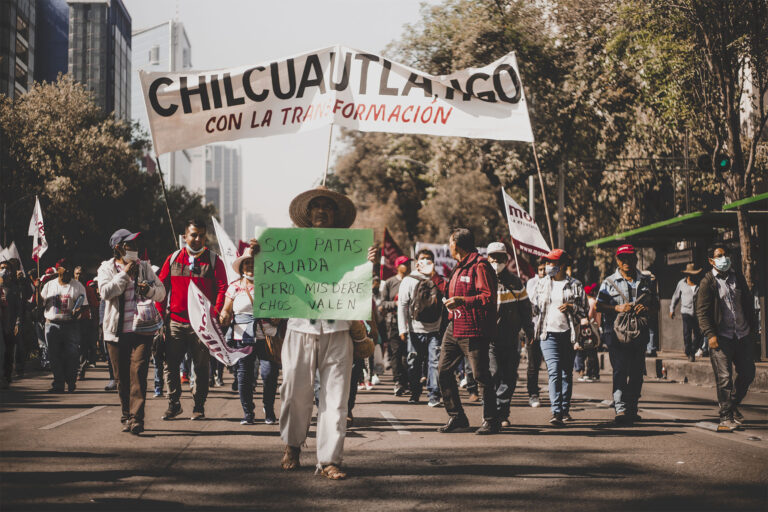Of Principled Pragmatism & Other Demons
This editorial by Ricardo Orozco first appeared in the July 8, 2025 edition of Revista Común.
Following former President Ernesto Zedillo Ponce de León’s remarks about the nature of democracy and tyranny in Mexico, one of the most talked-about public debates in recent months, both among those within and outside the Obradorist movement, had to do with the ways in which governments emanating from the National Regeneration Movement (Morena) have decided to manage the integration into their ranks of figures who—to put it briefly and in the language now characteristic of that political movement—seem to be irrefutable incarnations of “old politics” and the “ancien régime.” Personifications, then, of those against whom Andrés Manuel López Obrador always wielded the maxim “we are not the same.” This is, therefore, a debate centered on the Manichean opposition between purists and pragmatists.

Specifically, this time, the discussion arose from the appointment of Adrián Rubalcava, former district head (2012-2015) and former mayor (2018-2024) of Cuajimalpa de Morelos, Mexico City, as the new director of the Metro Mass Transit System, starting in May of this year. Given his political history, there were many voices, both within and outside the Obrador party, who pointed out how counterproductive it would be, for the current prestige of the Movement and for its future political viability , to reward one of the most questionable figures in the PRI in the last ten years with such a strategic public position for the capital’s future.
Specifically, this time, the discussion arose from the appointment of Adrián Rubalcava, former district head (2012-2015) and former mayor (2018-2024) of Cuajimalpa de Morelos, Mexico City, as the new director of the Metro Mass Transit System, starting in May of this year. Given his political history, there were many voices, both within and outside the Obrador party, who pointed out how counterproductive it would be, for the current prestige of the Movement and for its future political viability, to reward one of the most questionable figures in the PRI in the last ten years with such a strategic public position for the capital’s future.
At its core, the disagreement over Rubalcava’s appointment stems, above all, from two considerations: first, the questioning of his technical and professional credentials for his new position; and second, the legitimate doubt as to whether, among so many supporters, sympathizers, and/or militants of the 4T so well qualified to fill the role, no one better could truly be found.
Faced with such objections, an intellectual and media backlash immediately erupted within Morena, focused on defending the aforementioned appointment as a measure that, given its presumed origin—the Presidency—should be accepted and defended on its own terms. That is, assuming it was simply a matter of giving the former deputy of the Legislative Assembly of the Federal District (2015-2018) an opportunity to demonstrate his capabilities as a public servant in fulfilling the task entrusted to him. Namely, addressing the many crises facing the country’s largest public transportation system.
In the media, social media, and intellectual networks, it emerged that the objectionable aspect of the matter had nothing to do with the appointment itself, but rather with the political and ideological positions of those who criticized and questioned the designation.
Having set the terms of the discussion in this way, the intellectual poles in which the internal debate ended up being configured were, on the one hand, the defenders of pragmatism, in any of its versions (tactical, strategic, dogmatic, etc.), and, on the other, the defenders of principles, also in any of its variants (the naive, the idealists, the academics, etc.).
Now, the controversy between principles and pragmatism, of course, is not new to the current administration, nor was it new to Andrés Manuel’s presidency, in the context of figures such as Manuel Bartlett or Lilly Téllez. More recent cases than Rubalcava’s were the Morena party’s internal candidate selection process for the 2024 elections and, during the second half of that year (when national politics was almost entirely absorbed by the discussion surrounding the Reform of the Federal Judicial Branch), Morena’s support in the Senate of the Republic of the until then proud PAN member Miguel Ángel Yunes Márquez, in order to obtain enough votes to approve the constitutional reform.
In all cases, both within and outside Morena and Obradorism —but also, in general, within the public agenda and the media (and within that decadent avatar of its own, the social-digital networks)—the questioning of the legitimacy of the means by which Morena and Obradorism sought to achieve the promised regeneration and transformation of national public life in the future, now without López Obrador at the helm, was placed at the center of the national debate.
In fact, this debate has been so persistent both within and outside the party that, among much more limited, but no less important, like-minded intellectual circles, reflection on this dyad has also been raised to debate the commitment to the cause of the 4T of figures who had in fact been accompanying Andrés Manuel and his mass movement for a long time, but whose motives for doing so had less to do with the transformation in and of itself than with the potential political benefits they could obtain if they remained relatively aligned with López Obrador’s rhetoric.

Within Morena, for example, the approaches of figures such as Paco Ignacio Taibo II, in each of the party’s National Councils in which he has participated, have been illustrative of this line of thinking. These approaches, incidentally, beyond their apparent strident nature and their emphasis on Morena’s abandonment of its ongoing grassroots work, have persistently prompted party supporters, adherents, and militants to reflect on the opportunism of those who join the 4T seeking office and, even more so, on the hypocrisy of those who hold high rank within Morena but who, while waving the banners of Obradorism, repeat the most despicable practices of the PRI’s political culture, starting with its clientelist and corporatist tendencies.

Characters such as Ricardo Monreal (and his family), Marcelo Ebrard, Mario Delgado (when he led the party and now as improvised Secretary of Education) or Adán Augusto López (as Governor of Tabasco, Secretary of the Interior and, now, Senator), to go no further, have persistently shone by their presence among the criticisms that many Morena intellectuals have made to the party and the national project that it leads, either because, from the point of view of principles, they are legitimately questioned for their words and actions, or because pragmatists of different kinds ingeniously defend them, assuming that without their participation in the Fourth Transformation it simply would not stand.
In similar terms, intellectual disputes of this kind have also been at the heart of the process, no longer of the integration of figures from old politics into the transformation project that the main political leaders of the 4th Transformation claim to defend, but rather of political decisions made by Morena legislators in both chambers of the Congress of the Union to defend causes of dubious political legitimacy and even more questionable ethical integrity. The rejection of the impeachment of the former governor of Morelos (2018-2024), Cuauhtémoc Blanco, so that he could face the criminal proceedings against him without legislative immunity, is, to this day, the paradigmatic case of this. Even more so when cases like this one involve different forms of gender-based violence… in the time of women. On that occasion, the debate was also rekindled about the need to prioritize principles over pragmatism, and vice versa.
Now, beyond the multiple and very diverse complaints focused on disqualifying, a priori , the adversary, among the various arguments that Morena’s pragmatism has defended until now – that is, the one that assumes that every pragmatic decision is correct because it has been made based on unrestricted respect for the principles of Obradorism (something like a principled pragmatism, excuse the oxymoron), there are three, in particular, that should be paid attention to and discussed in detail. Namely:
- The one who makes fear of the extreme right in the world his justification to pragmatically defend the fragility of the transformation underway in Mexico;
- He who dismisses the defense of principles as an abstract defense of all principles, incapable of realistically understanding the nature of contemporary politics; and
- He who downplays the seriousness of the whole discussion by stating that the cases that serve as empirical evidence in principled criticism are exceptions to the rule: a tear drop in an immense ocean.
In the case of the first argument, while it is correct to highlight a threat looming throughout the West (the emergence, strengthening, and consolidation of old and new extreme right-wing movements), what is often overlooked is the concrete analysis of the current and potential balance of forces in Mexico, both at the level of domestic politics and its international relations. And the fact is that, while the extreme right-wing shift experienced in many parts of the world is undeniable, primarily in the West (including the Americas), what is not entirely clear here is why, if in Mexico the balance of power, both effective and potential, is not clearly weighted in favor of the extreme right in the country, within Morena and some very specific circles of Obradorism, it is taken for granted that the Movement and the Federal Government’s national project must be constantly reinforced with the addition of figures from “old politics” and with concessions to its main historical and contemporary leaders (regarding the also ill-fated impeachment of Alejandro Moreno Cárdenas, National President of the PRI).
In politics, very few things are as despicable to the masses as left-wing parties that present themselves as morally distinct and superior alternatives to their right-wing adversaries and, once in power, begin to emulate them, while masking their imitation with heavy doses of rhetoric
Anyone, of course, could argue that, deep down, Morena, Obradorism, and the national project currently led by Claudia Sheinbaum Pardo are not, in reality, as strong or as well-positioned as they seem. However, in reality, whatever empirical evidence is used to assess their vigor, they always come out on top over their adversaries. The famous moral defeat of the opposition, pointed out by Andrés Manuel on more than one occasion during his term, was not, in this sense, a vain invention of his, nor, much less, a figment of his whim. It was, rather, a sort of refrain that truly reflected the decline that the historical adversaries of Obradorism ‘s mass politics were already beginning to experience.
That this moral defeat never extended to the level of the balance of power pitting large national and transnational capital against the politics of the Fourth Transformation is another story. And one, without a doubt, in which it cannot be seriously asserted that capital, that the capitalists with interests at stake in this country, are in the same state of defeat as the PAN and PRI. This, however, in no way changes the fact that the political forces that had historically operated as transmission belts for the interests of those bourgeoisies are now neither in crisis nor in open decline, and do not appear to have sufficient programmatic and operational options in the immediate future to organically recompose themselves.
And it is precisely there where the argument based on fear of the far right in the world loses focus of the concrete situation in Mexico: given the defeat suffered by the traditional political forces of the old party system, today, most of the political dispute in the country is managed and attempted to be resolved within the limits provided by Morena, as a political party, and Obradorism, as a mass movement. It is within both where today not only anyone seeking an immediate successful political career seeks to cultivate their image, their contacts and their media projection, but – and even more importantly – it is there, within both, where opposition to Sheinbaum’s national project is brewing today.

This, in principle, is happening with bets like that of Marcelo Ebrard, who seems to feel he has the legitimate right to inherit the next six-year term and, consequently, is seeking, through the Ministry of Economy, to build the foundations of what would be his 4T of middle classes, while fulfilling the agenda entrusted to him by the President of the Republic to make the socially produced wealth in the country the framework for the expansion of shared prosperity. But also, apart from bets like this, within Morena and Obradorism there are much less ambitious and more genuinely oligarchic projects, such as those personified by Ricardo Monreal, from the Chamber of Deputies, and Adán Augusto López, from the Senate: oppositions, both of which are constantly seeking to snatch political concessions from Claudia Sheinbaum that personally benefit them and their closest political circles.

Given the unrestricted defense of pragmatism in Mexico as a way to keep the country safe from the threat of the far right around the world, one must question whether what is gradually strengthening them in this country (personally, but also as a collective political project) is not, precisely, a policy of unrestricted openness to figures from the “old regime” who, like Monreal Ávila, despite bearing the party’s initials and publicly employing some of the most dogmatically Obradorist rhetoric , insistently operate in favor of constructing their own stockpiles of power. Or has it no longer been remembered that it was Ricardo Monreal who operated, from the Senate, to sabotage some of Andrés Manuel’s most important legal and constitutional reforms during the previous six-year term? Party affiliation does not make one a Morena supporter.
This doesn’t mean, of course, that these figures, given their internal opposition, are personifications of the Mexican far right. Recognizing their actions as a fifth column within Morena, however, does imply acknowledging that they are a more debilitating factor than the far right itself can be.
What objection, on the other hand, can be made to the second argument advocating for pragmatism as a system in Morena’s political decisions? What is incongruous here is that, by labeling those who argue for principles as purists, idealists, naive , philosophical, and academic, etc., it is done on the basis of the recognition that a defense of principles loses sight of the fact that the country’s politics are not for principles because politics here is what it is and governed by singular rules. What is unsettling here is, consequently, that while it’s maintained that it’s pragmatism that allows transformation and regeneration of national public life to advance, it is conceded that the political reality we live in simply does not respond to principles that privilege decency over effectiveness, preparation over positions and assignments, consistency over gatopardismo, and so on.

We should therefore ask those who support this argument how a political culture, the ways of exercising power, and the nature of the public sphere are transformed in contemporary capitalism when principles that underpin precisely these changes are not defended. The easy way out of this question is to maintain that the ends justify the means, and that it is in the former (in the ends) and not in the latter (in the means) that the transformation of national politics truly comes to fruition. Clearly, in this stark, abstract, and fallacious division of the dialectical relationships between ends and means, what is not fully understood is that the means are not simply neutral instruments at the service of a cause that surpasses them and redeems them in their nature through the justice achieved through them. On the contrary, they are an integral part of the legitimacy and justice of the ends pursued.
If the above is lost sight of, then the left in Mexico and around the world will be left defenseless in the face of the emergence, strengthening, and consolidation of new and old extreme right-wing movements, since the left is distinguished from the right not only by the ends it pursues, but by the means it employs to achieve them. And in the Mexican case, as has already occurred in many parts of the Americas, the correct distinction between this crucial aspect of the right-left political continuum is what ultimately determines whether, in the eyes of the citizenry, not everyone is equal and, consequently, whether that same citizenry, after a while, will not end up demanding either “that they all go” or that the extreme right replace in government positions a left-wing movement that often failed to distinguish itself from everything the electorate already despised about “the old politics.” In politics, very few things are as despicable to the masses as left-wing parties that present themselves as morally distinct and superior alternatives to their right-wing adversaries and, once in power, begin to emulate them, while masking their imitation with heavy doses of rhetoric.
Finally, regarding the third argument (that the cases experienced so far are the exception rather than the rule), it would be worth merely issuing a seemingly innocent and irrelevant warning: it may be that, in truth, for now the cases of pragmatism plaguing the 4T are a small exception in the face of the immensity of national politics. The problem, however, is that what is being excused here has to do only with the national dimension of Mexican politics; no attention is being paid to the hundreds of cases proliferating in the realm of local politics, in the municipalities, where the Rubalcavas and Yunes Márquezes continue to be the daily bread of millions of Mexicans.
Furthermore, in relation to this argument, several things would require in-depth reflection: How many exceptions remain exceptions? Does every exception carry the same weight as the others, or are some more questionable than others? When these exceptions are appointed to positions and/or assigned strategic responsibilities, are they still exceptionalities without the capacity to impact the rule to which they are deemed an exception? What degree of tolerance for pragmatism is it legitimate to demand from citizens before dismissing them as purists, naive, idealists, academics, unrealists, and inexperienced in the fine art of politics? And, more importantly, at what point does one exception, or a couple of exceptions to the rule, become a sufficient rule to completely discredit the “we are not the same” narrative?

Whatever the answer to these questions, one thing is certain: the Obradorist party ‘s lack of cadres and the inadequacy of its political training program remain evident. Today, after all, it is important to recognize that meeting the requirements demanded by Morena and the 4T of former PRI, PAN, and PRD members to demonstrate that they are authentic Morena converts is not at all sufficient. Particularly because, to a large extent, the glue that holds the many factions within each party together is based on the personal charisma exuded by figures like López Obrador and Claudia Sheinbaum. Looking ahead, however, internal cohesion in this transformation project cannot continue to be sustained by charismatic replacements.
The current National Leadership of Morena, through its president, Luisa María Alcalde, has stated more than once that the party cannot remain hermetic and needs to open up to many diverse profiles to maintain its strength. She has also stated on multiple occasions that internal criticism is acceptable when the Movement’s rank and file disagree with the decisions made and the individuals who join or assume strategic roles within the 4T. Despite this, however, she has also insistently maintained that the primary objective of the political institution she presides remains to avoid playing into the hands of the right. What exactly does that mean? Does this mean that, if the opinions of the opposition commentariat to the 4T and the criticisms made from within Obradorism and Morena are convergent or coincident, despite being motivated by different principles (political carrion in the former, constructive criticism in the latter), then sympathizers, adherents and members of Morena should better keep their criticism to themselves so as not to play into the opposition’s hands?
It is true that every process of national transformation and regeneration is, by definition, fragile. Right now, however, the fragility of the process underway in Mexico stems from the attempt to fill the party, the movement, and the national project with figures who represent everything the majority didn’t vote for in 2018 and 2024. Neither repentance (when it exists) is sufficient without repairing the damage done during the years of the “ancien régime,” nor is aligning oneself with the current presidential will sufficient to demonstrate anyone’s ideological and political conversion. What is needed here is to build a political career by campaigning for the cause before accessing any position of public power.
-
USMCA Review Needs to Include More Than Just Corporate Interests
Mexico’s Economy Secretary Ebrard has cancelled social organization consultations and adopted a rhetoric of supplication towards corporate interests in advance of the USMCA review.
-
Berdegué, Agribusiness Hatchet Man
With a crippling national farmers strike only one bad meeting away, the government’s disregard for Mexico’s agricultural crisis has a surprising face: its Secretary of Agriculture.
-
Classism & Racism in the Era of the Fourth Transformation
In a world where dehumanization, exclusion, persecution of people based on their ethnicity, racism, and classism are exponentially increasing, these practices are not isolated incidents; they are symptoms.




